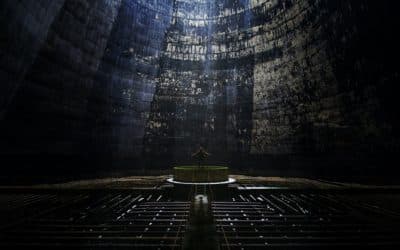
Feature
Sci-fi Suspense
D. Edward
Suspense in and of itself in any genre is difficult to achieve.
It is exceptionally difficult in sci-fi because there are less inherent rules from which the story can subvert expectations. If you are reading a non-sci-fi story set in Paris in the 1920s, and our protagonist is chased onto a ledge at the top of the Eiffel Tower, it would be suspenseful because we all know that if you fall from that height, you will eventually hit the ground and die.
Gravity is an inherent and accepted rule of the world of 1920s Paris.
A storyteller doesn’t have to spend time setting up the rules of gravity there, we come into the story collectively with the same experiences and a fundamental understanding of how gravity works. Instead, the suspense comes from discovering if the protagonist falls or not, and if not, in how they get off the ledge and escape their pursuers.
Let’s call our collective understanding of gravity a shared experience.
In sci-fi it’s not the same.
In sci-fi the storyteller must spend time explaining what the rules are. This means inherently we get to the ledge later in the story, and we need to remember if gravity works the same, or not; and if not, why not? How is it different? Is the reason it’s different something that makes sense?
Plus, as a reader, we have had to work a lot harder. Instead of relying on a shared experience, each of us as readers must imagine gravity working differently. The risk is that the explanation comes across in different ways to different people.
This results in the sci-fi world ‘rule changes’ being an individual experience, not a shared experience.
How many times have you said or been told:
“There is so much sci-fi exposition in the story.”
“Nothing happened for the whole first half of the book.”
“It was frustrating there is no way X would work like that.”
Maybe even using your individual experience as the reason you didn’t like a particular sci-fi story. People will inherently understand the sci-fi rules differently, and there can be all kinds of rules; dozens of individual experiences across a single story; dozens of chances to lose a reader or fail to build real suspense in the story.
To combat that, sci-fi authors often provide examples of the different rules in action in the form of exposition. This can be important, but in so doing the exposition pushes the suspense, the ledge, yet farther back in the story.
More reading, more work, less suspense.
It can be even worse as collectively in sci-fi, if we remedy the exposition by skipping it, and hurry up to get to the exciting stuff, without knowing all the rules, we can have an even bigger problem. We’re going along all nervous that our protagonist is high up on a ledge and in mortal danger, but then we learn that they have flying shoes! Hurray! Why didn’t they use them earlier?
Wait, they were never in danger in the first place?
Bad story! Bad! Get down.
Finally, there is the mother-in-law-of-them-all counter-suspense dangers in sci-fi: technobabble.
Technobabble is even more exposition we must read through before the suspense of the ledge, and it introduces yet more individual experiences into the story.
You know what technobabble is: a pseudoscience like gibberish that usually provides framing for the magical thing that changes the rules.
Flying shoes were invented in 2067 when Alice Wonkers discovered she could bend gravity using magnetic field distortion. It was a funny accident; she was working under an MIT grant for her fifth PH.D. examining field effects of microwaves on magic whosawhats. Her lab assistant installed the thingamajig backwards and, suddenly, the beams were racing out into space, completely disconnected from earth’s gravity field…
It takes a lot for the audience to buy into it, and not everyone will. The storyteller is now asking even more from their reader, slogging through even more exposition, pushing the ledge even farther back in the story.
So, a reasonable question: If sci-fi is so complicated to set up, how come there is so much good sci-fi?
Good sci-fi weaves the exposition into the story in a meaningful way; uses it to help build the suspense, not delay it.
The method has a name: Chekhov’s Gun.
The basic rule of Chekhov’s Gun is that you can’t use an element to resolve suspense unless you have already introduced the element as part of the story. The protagonist can’t run to get the gun to save the day in Chapter 9 unless the gun was introduced somewhere earlier, usually Chapter 1 or Chapter 2.
But in sci-fi Chekhov’s Gun requires more thought than other genres to successfully work. Good sci-fi doesn’t just introduce the element, it must integrate the element into the story.
It must trade exposition for integrated demonstration.
Case in point: Star Wars.
Within the first five minutes we see Darth Vader use the Force. They are still writing exposition in those movies to try and explain the Force almost fifty years on, but we all got it in the first five minutes.
Exposition alone could never work, watch any other Star Wars movie other than the first three.
Midichlorians anyone?
Instead of exposition, the original Star Wars used integrated demonstration in a very natural way. It moved the story forward while also fulfilling Chekhov’s Gun’s requirements. The Force is an important element to the suspense of the original Star Wars. The anticipated resolution of the entire story is transposed into a shared experience by the end. We all learned about the Force on the same journey. The story becomes our shared experience, we know how the Force works by the time it matters most.
Suspenseful sci-fi fully integrates the different-from-the-real-world rules into the story, in some ways the story is about the different rules. Understanding the different rules leads to the resolution of the conflict; the different rules are the story subtext.
It’s hard to get right and it’s why a lot of sci-fi lacks real suspense.
The ability to change the sci-fi rules opens up endless possibilities, and when it’s done well, cleverly integrated, I think sci-fi can present some of the most thoughtful, eye-opening, and excitingly suspenseful stories in any genre.
About the Author
D. Edward served as a Special Agent (SA) in the US Army in the 1980’s and 1990’s and is a veteran of multiple overseas combat tours. He was the Special Agent in Charge (SAC) of the 1990 Panama Canal counter-terrorism threat assessment report to the US Congress.
Edward is a graduate of the United States Army Intelligence School where he studied advanced HUMINT (Human Intelligence) and battlefield counterintelligence; also completing training at the Jungle Operations Training Center in Panama, Central America. He holds advanced degrees in engineering including a Ph.D. from NCU, three related M.Sc. degrees (MBA, MSIT, MSIM), and has an undergraduate degree in business (BSBA).
His books typically reach the Amazon Kindle top 10 upon release in their genre. ‘End of Reason’ was his first work to reach #1 on Amazon in its category, on June 22, 2021. ‘Unreasonable’ reached #1 as a pre-order and held the spot for over a month upon release.
You can follow his publication schedule and books at:
https://www.amazon.com/author/d.edward
He did have a twitter account but then he thought it was stupid so he canceled it.

More Sci-Fi Suspense Features
Space Opera Thrillers
Nail-biting tension in worlds of spaceships and doom
Artificial Intelligence in Thrillers
AI and Identity in Thrillers
Sci-fi Mysteries
Why we love science fiction mysteries
Advertisement



